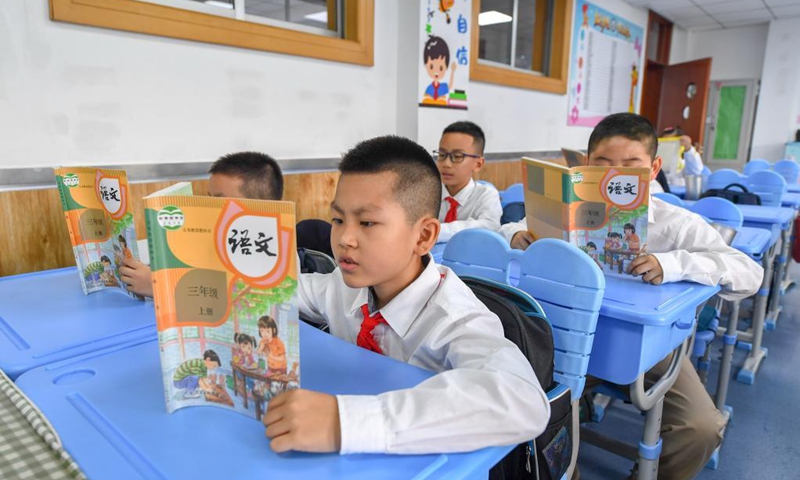China eases student pressure with 'strongest moves in decades,' but concern about new inequality lingers

Primary students read in the morning session at a school in Changchun, capital of northeast China's Jilin Province. (Xinhua/Zhang Nan)
China's new school year will begin after the Ministry of Education on Monday issued new requirements, including limiting the number of exams among students, as part of China's ongoing "strongest moves in decades" to ease the burden on students.
At a Monday conference, the ministry said that first and second graders should not be given written examinations. For other grades, schools should give only one final examination every semester, compared with previous routines for schools of jamming multiple exams into a semester.
Education officials on Monday reiterated a ban on schools setting up "priority" classes for gifted students.
The ministry added that difficulties of exams should be set within a reasonable scale, and any question beyond the normal teaching schedule must be avoided. Midterm and final exam results should be given by grades instead of scores.
The ministry said excessive pressure on students from a young age "harms their mental and physical health."
"Too many exams and too much burden for young children damage their eyesight, and are unnecessary because young kids sometimes don't even understand what the exam papers say. Restricting exams can give them back their happy childhood," Li Yu, a mother of an elementary school student in Beijing, told the Global Times.
The measures announced by the ministry on Monday are part of wider government reforms of China's education sector, which was called "double reduction," which education analysts called "the strongest measures in decades" to ease the burden on students, including banning cram schools and off-campus tutoring agencies from giving lessons on core school subjects on weekends and holidays. Some parents hailed the policies as a "good start."
As the new semester begins, schools in some provinces rolled out support measures for the country's "double reduction" policies.
A father of a second grader in Beijing's Shijingshan district told the Global Times that his son's school has rescheduled morning time for school to 8:20 am from 7:50 am.
The school also arranged two hours of "after-school time" for children after the 3:30 pm dismissal, during which students can participate in the arts, sports and academic tutorials. Before the "double reduction" policies, the after-school time of a student was normally for them to attend tutoring classes outside of the school arranged by their parents.
A teacher who requested anonymity in Southwest China's Chongqing Municipality said her school is also exploring a similar path of using after-school time to offer students art, literature and sports courses.
An expert from a research institute affiliated with the ministry described the "double reduction" measures as the "strongest in decades" to ease the burden on students, as "the problem in our education evaluation system has resulted in excessive burden on students and parents."
"We've been talking about easing the burden on students for years, yet there was no substantial result," said the expert, noting that this time the government is determined to make it right.
According to the Xinhua News Agency, China's off-campus tutorials are worth 2 trillion yuan ($300 million), and elementary and middle school tutorials account for 40 percent.
Yet there are also concerns among parents in how those policies will be implemented, or if it will give rise to a new type of education inequality, where families with more money would have private tutorials for their children at home.
The anonymous expert said that there will inevitably be issues during a reform, yet the reform will lead the country's education system to a healthier direction, create a better growth environment for students.
He predicted that our evaluation system will be at the end of our reform, which means the scores-oriented system will eventually be refined. "In the future, grades will be a less dominant factor in evaluating a student's ability. That means students will be less dependent on tutorials."
Photos
 Dance show saluting traditional culture of the Song Dynasty makes its debut
Dance show saluting traditional culture of the Song Dynasty makes its debut Village in SW China’s Yunnan embraces prosperity through agricultural tourism
Village in SW China’s Yunnan embraces prosperity through agricultural tourism Eighth birthday for pair of giant pandas celebrated in Haikou, Hainan province
Eighth birthday for pair of giant pandas celebrated in Haikou, Hainan province Olympic gold medalists portrayed in Shanxi artist’s polymer clay sculptures
Olympic gold medalists portrayed in Shanxi artist’s polymer clay sculptures
Related Stories
- China says no to excessive workloads for young students
- China moves to reduce examination pressure faced by students
- China to tighten registration of off-campus training institutions
- China enriches school curriculum with more traditional culture, other major thematic contents
- Tibetan elementary school students do morning exercises
Copyright © 2021 People's Daily Online. All Rights Reserved.






